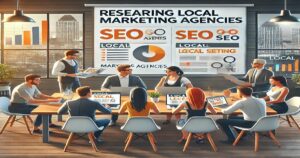Understanding Your Marketing Agency Needs
Before diving into the search for the best marketing agency near me, it’s crucial to define your business needs. Understanding your unique challenges and goals will streamline the process and help you identify the right agency faster. Many businesses often struggle with not knowing where to start, but a proper evaluation of your current marketing efforts sets a strong foundation.
Assessing Your Current Marketing Situation
Assessing your marketing situation isn’t just about checking what’s working and what’s not—it’s also about discovering missed opportunities. Consider the following when evaluating your current marketing efforts:
- Evaluate performance metrics: Analyze metrics such as conversion rates, engagement levels, and ROI on recent campaigns.
- Identify gaps: Are you struggling with lead generation, social media engagement, or website traffic? List specific areas of improvement.
- List tools and software: Understand what tools you’re already using. Is your team using tools like Google Analytics or HubSpot effectively? Are you under-utilizing SEO platforms like SEMrush or Ahrefs?
- Analyze past campaigns: Review campaigns you’ve run in the past year. Did your social media, PPC, or email marketing perform as expected?
This assessment helps narrow down the type of expertise you need from a marketing agency, whether it’s in SEO, social media, or content marketing.
Setting Clear Marketing Goals
Once you have a clear picture of your current situation, you can move on to setting clear, measurable goals. Think about what success looks like for your business.
- Increased website traffic: Do you want to grow your organic traffic by a specific percentage within six months?
- Higher conversions: Are you looking to increase lead conversion rates or customer acquisition rates?
- Brand visibility: Is the goal to boost your brand’s awareness through social media and content marketing?
For example, a local retail business might set goals like improving local SEO to bring more foot traffic into their store, while an online e-commerce brand might focus on increasing cart completions.
Additional Goals to Consider:
- Customer retention: You may want to focus on repeat customers and create loyalty programs that boost retention.
- Social proof: Strengthening online reviews and generating user-generated content can be part of your marketing goals.
Key Takeaways:
- Understand your current marketing challenges and resources.
- Set specific, measurable goals, such as increasing website traffic by 20%.
- Know your budget range and prioritize services you need (e.g., SEO, PPC, Social Media Management).
Types of Marketing Agencies to Consider
Choosing the right marketing agency depends on your business goals and size. Every agency has its own strengths, so it’s essential to understand the different types before you start reaching out to them.
Full-Service Marketing Agencies
Full-service agencies are perfect for businesses needing comprehensive marketing support. They typically offer:
- Integrated campaigns: These agencies provide coordinated marketing strategies across multiple channels, ensuring your brand’s message stays consistent.
- Digital and traditional marketing services: From TV commercials to Google Ads, a full-service agency will handle all aspects of your marketing.
- Content and creative services: They often have in-house creative teams to develop videos, graphics, and written content for your campaigns.
Example:
A full-service agency might help a local furniture store run geo-targeted Google Ads, launch a new website with local SEO optimization, and manage seasonal social media campaigns. This agency handles everything from strategy to execution, ensuring consistency and synergy across all channels.
Specialized Marketing Agencies
Specialized agencies are ideal for businesses that need help with a specific aspect of marketing. These agencies typically focus on areas such as:
- Search Engine Optimization (SEO): Agencies specializing in SEO can boost your website’s visibility by optimizing content, improving website speed, and securing backlinks.
- Social Media Management: If social media is a core focus for your brand, an agency specializing in this area can craft highly targeted campaigns to engage your audience.
| Agency Type | Best For | Typical Services |
|---|---|---|
| Full-Service | Businesses needing comprehensive solutions | SEO, PPC, Social Media, Branding |
| Digital | Online-focused businesses | SEO, PPC, Social Media Management |
| Specialized | Companies with specific marketing needs | SEO, Content Marketing, Social Media |
| Local | Small to medium-sized businesses | Local SEO, Community Engagement |
Example:
A company looking to boost their Google rankings might hire an SEO-specific agency that focuses on keyword research, on-page optimization, and backlink acquisition. The results would be higher organic traffic and better SERP rankings.
Industry-Specific Agencies
Some agencies specialize in particular industries, offering tailored solutions that align with industry-specific challenges. For example:
- Healthcare marketing agencies know the intricacies of HIPAA compliance and can run patient outreach campaigns.
- E-commerce agencies are experienced in optimizing product listings and setting up conversion-optimized ads on platforms like Google and Facebook.
Understanding which type of agency best suits your business is critical to narrowing down your choices.
How to Research Local Marketing Agencies
Finding a great marketing agency near you involves more than just Googling “marketing agency near me.” Here are key strategies for your research process:
Online Search Strategies
When searching online, use a combination of keywords that focus on your location and needs:
- Use location-based keywords: If you’re based in Portland, search for “digital marketing agency in Portland” or “best SEO agency near me.”
- Read client testimonials and case studies: Visit agency websites to read about their previous projects and client experiences.
- Check their digital footprint: Are they active on social media? Do they have a blog? Agencies with a robust online presence often practice what they preach.
Additionally, look for agencies that specialize in your industry. For example, if you run an e-commerce business, you may want to work with an agency that has experience in boosting online retail sales.
Checking Agency Credentials
To ensure you’re working with a reputable agency, look into:
- Years in business: Agencies that have been around for at least five years are likely stable and experienced.
- Certifications: Look for agencies that have certifications in Google Ads, HubSpot, or Facebook Blueprint, which indicate expertise.
- Team expertise: Review the agency’s leadership team and check their LinkedIn profiles to ensure they have experienced professionals leading campaigns.
For a deeper dive into evaluating agencies, check out this guide to choosing a trusted digital marketing agency.
Questions to Ask Potential Marketing Agencies
When interviewing potential agencies, you want to ask the right questions to assess whether they align with your business objectives.
Experience and Expertise
- How long have you been in business? This gives insight into the agency’s stability and long-term success.
- Do you specialize in any industries? This helps you understand if the agency has the expertise to navigate your industry’s challenges.
- Can you share case studies? Ask for case studies that are relevant to your business. For example, if you’re in retail, look for case studies showing success in increasing foot traffic or e-commerce sales.
Service and Strategy Questions
- What services do you handle in-house vs. outsource? Agencies that handle everything in-house may offer quicker turnaround times and more cohesive strategies.
- How do you measure success? Make sure the agency’s performance metrics align with your goals. Are they focusing on traffic, leads, or conversions?
- What’s your approach to reporting? Regular reporting and transparent communication are essential for keeping campaigns on track.
These questions will help you assess whether the agency is a good fit for your long-term marketing needs.
Evaluating Agency Proposals
Once you’ve narrowed down your list of potential agencies, it’s time to dive into their proposals.
Comparing Service Packages
Marketing agencies typically offer various packages based on the level of service you need. When comparing them, look for:
- Scope of services: Ensure the agency’s services align with your needs (e.g., SEO, social media management, PPC).
- Pricing structure: Some agencies offer monthly retainers, while others may charge per project. Make sure pricing is clear and fits within your budget.
- Contract terms: Review contract lengths and ensure there is room for flexibility, especially if you’re testing the agency for the first time.
Check out this resource on maximizing your ROI when choosing between agency proposals.
Red Flags to Watch For
Some red flags to watch for when evaluating proposals:
- Unrealistic promises: Claims like “guaranteed #1 Google ranking” are a major red flag. SEO results take time, and no agency can guarantee this.
- Vague deliverables: Be wary of agencies that don’t provide detailed explanations of their services.
- Limited communication: Poor communication early on may indicate future issues with transparency and reporting.
Setting Up for Success with Your Chosen Agency
Once you’ve selected an agency, it’s time to set the stage for a successful collaboration.
Establishing Communication Channels
Clear and consistent communication is key to ensuring your campaigns stay on track:
- Regular meetings: Schedule weekly or bi-weekly check-ins to go over progress reports and address any issues.
Reporting frequency: Agree on how often you’ll receive performance reports (typically, monthly reports are standard).
- Point of contact: Establish a primary point of contact to streamline communication and avoid miscommunications.
Creating Clear Expectations
- Project timelines: Work with the agency to create a timeline for each phase of the campaign, from strategy development to execution and analysis.
- Deliverable specifications: Make sure there’s clarity on what you expect in terms of content, ad creatives, and SEO optimizations.
- Success metrics: Establish clear KPIs that align with your goals. For example, if you’re focusing on lead generation, ensure that conversion rates are a key performance indicator.
Budget Considerations for Marketing Agency Services
Understanding the costs associated with hiring a marketing agency is crucial to ensuring you get the best value for your investment.
Pricing Models
There are several pricing models that agencies typically use:
- Retainer-based services: A set monthly fee for ongoing services like SEO, content marketing, or PPC management. This model is ideal for long-term partnerships.
- Project-based pricing: Agencies may offer a one-time project fee for specific work, like designing a website or launching a product.
- Performance-based fees: Some agencies offer performance-based pricing, where you pay based on results, such as the number of leads generated.
| Service Level | Monthly Investment | Best For |
|---|---|---|
| Basic | $1,000 – $3,000 | Small businesses |
| Standard | $3,000 – $7,000 | Medium-sized businesses |
| Premium | $7,000+ | Large enterprises |
| Custom | Varies | Niche or large-scale projects |
Additionally, some agencies may use hybrid models, combining elements of retainer and performance-based fees, which can be particularly attractive to businesses looking for flexibility.
Technology and Tools Used by Modern Marketing Agencies
Modern marketing agencies utilize cutting-edge technology and tools to ensure optimal performance for their clients.
Essential Marketing Tools
Most agencies rely on a combination of tools for analytics, project management, and performance tracking:
- Google Analytics: For tracking website traffic and user behavior.
- SEMrush/Ahrefs: For keyword research, backlink tracking, and SEO analysis.
- Hootsuite/Buffer: Social media management tools that help agencies schedule and track posts across platforms.
- HubSpot: A popular CRM platform that enables agencies to manage leads and customer relationships effectively.
Data and Reporting Capabilities
A professional marketing agency should provide robust reporting capabilities, including:
- Real-time tracking: With tools like Google Analytics or SEMrush, you should be able to track the performance of campaigns in real-time.
- Custom dashboards: Agencies should offer easy-to-read dashboards that provide insights into traffic, conversions, and engagement.
- ROI measurement: At the end of the day, results matter. A good agency will offer insights into ROI, whether that’s in the form of increased leads, sales, or brand awareness.
For more on how data can inform your marketing strategy, explore this resource on data-driven marketing decisions.
Best Practices for Agency Collaboration
Collaboration with your marketing agency is key to achieving long-term success. Here are a few best practices:
Effective Partnership Strategies
- Open communication: Foster a culture of transparency. When both the agency and client communicate openly, it’s easier to course-correct when needed.
- Timely feedback: Provide your agency with timely and actionable feedback on deliverables such as creative assets or campaign results.
- Collaborative planning: Involve the agency in your business’s strategic planning to ensure alignment between marketing goals and business objectives.
Measuring Agency Performance
- KPI tracking: Establish clear KPIs at the start of the engagement, and regularly track the agency’s performance against these indicators.
- Client satisfaction: Don’t hesitate to ask for regular feedback sessions to ensure that both parties are aligned and satisfied with the partnership.
Industry-Specific Marketing Considerations
Marketing strategies can vary significantly between industries. Here are some considerations for different sectors:
B2B Marketing Agencies
For businesses targeting other businesses, the marketing strategy focuses on:
- Longer sales cycles: B2B sales processes are often more extended, so the agency needs to focus on nurturing leads over time.
- Networking: Channels like LinkedIn are key for connecting with decision-makers.
- Content marketing: Whitepapers, case studies, and detailed product comparisons are often used to educate and inform potential customers.
B2C Marketing Agencies
For consumer-facing businesses, marketing typically focuses on:
- Brand awareness: Building strong brand awareness through social media, influencer partnerships, and email marketing.
- Quick conversions: B2C marketing often aims for faster sales, so strategies like remarketing ads or flash sales may be effective.
- Social proof: Using customer reviews, user-generated content, and testimonials to establish credibility and drive purchases.
For more on specialized marketing services, check out this resource on marketing for specific industries.
Common Marketing Agency Services
Digital Marketing Services
Digital marketing agencies typically offer a suite of services that revolve around growing your online presence:
- SEO: Search engine optimization is essential for driving organic traffic to your website.
- PPC Advertising: Pay-per-click advertising offers immediate traffic through platforms like Google Ads.
- Content Marketing: Engaging content like blog posts, videos, and infographics helps build authority and trust.
Traditional Marketing Services
While digital marketing is growing, traditional marketing still plays a vital role in many industries:
- Print advertising: For local businesses, print ads in newspapers or magazines can still drive foot traffic.
- Event marketing: Hosting or sponsoring events can be a great way to build brand recognition.
- Broadcast media: TV and radio ads, though costly, can reach a broad audience in a short time.
Key Takeaways
- Research thoroughly: Don’t rush your decision—vet multiple agencies before making a commitment.
- Clear communication: Maintain open and regular communication to ensure your goals align with agency strategies.
- Set expectations: Set clear KPIs and expectations from the outset to avoid confusion down the line.
- Monitor performance: Regularly review performance and make adjustments as necessary to stay on track.
Frequently Asked Questions
How much does a marketing agency typically cost?
Marketing agency costs vary widely depending on the services required, but a general range is $1,000 to $10,000 monthly. Factors such as the agency’s expertise, your market location, and the scope of services impact the price.
How long should I commit to working with an agency?
Most agencies recommend a minimum of six months to see meaningful results. This timeline allows for strategy development, campaign execution, and optimization. However, depending on your goals, a year-long partnership may provide better long-term results.
What results can I expect from working with a marketing agency?
Results vary based on your business goals and the marketing services used. Common results include increased brand awareness, more website traffic, higher lead generation, and improved ROI on marketing investments.
How often should I meet with my marketing agency?
Most businesses meet with their marketing agency at least once a month for a performance review. During campaign launches, you may want to check in weekly to ensure everything is on track.
Conclusion
Finding the right marketing agency near you can feel overwhelming, but with thorough research, clear communication, and a well-structured collaboration, you can form a partnership that drives real business results. The key is to align your goals with the agency’s strengths, ask the right questions, and monitor progress along the way.
Need expert guidance? Contact Nesace Media today to discover how we can help elevate your marketing strategy.
Sources:
- Choosing the Best Marketing Agency
- Maximizing ROI with Digital Marketing
- Data-Driven Decision Making in Marketing
- Specialized Marketing Services
- Effective Digital Marketing Strategies
External Source: Guide to Choosing a Digital Marketing Agency




